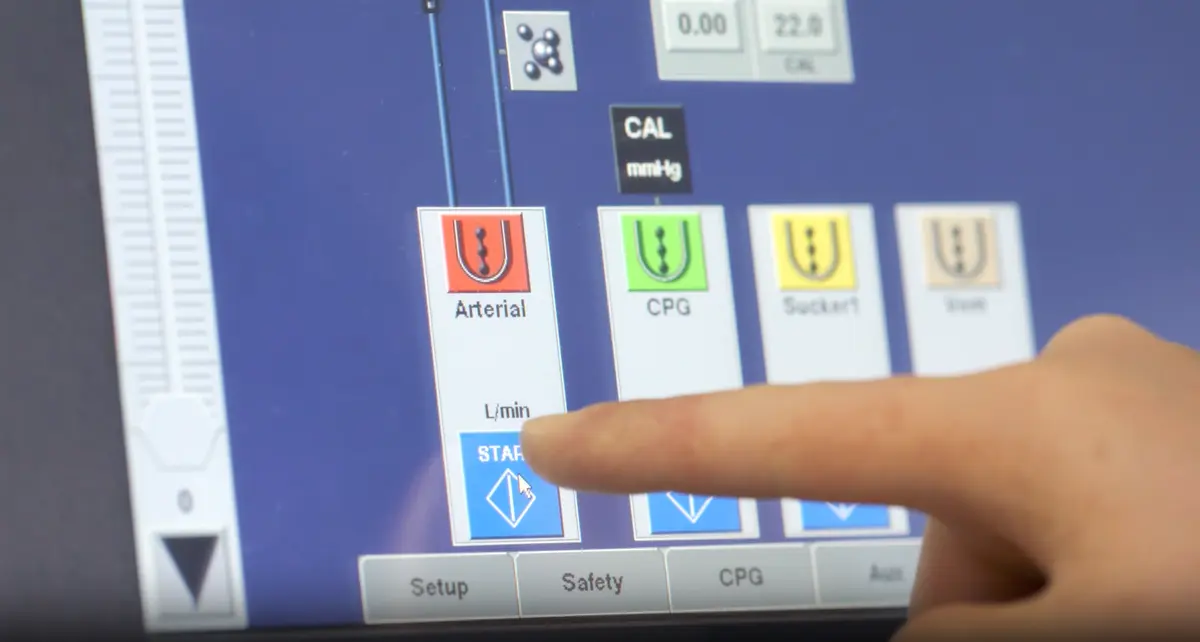I work for a company that manufacturers a comparable product to the cited Terumo device, and I can tell you that it’s most likely not greed but pending liability issues.
Those devices aren’t in use 24/7, and only need maintenance every 15 uses, so hospital staff trained to work on them get to use their maintenance knowledge like 3-4 times a year, at most. And since there must be a redundancy in the hospital both with machines (1 replacement on hand per 1 in use) as well as staff, this number even goes down since you alternate machines (thus stretching their use without maintenance) and people (so they both get to use their experience).
As a result, you end up with machines that are maintained by certified, yet unprofessional technicians. But since the device ends up with an ‘error free’ log, if anything were to happen to a patient due to a malfunction, the manufacturer assumes liability; and would then have to try and prove that it’s actually a human error by the technician.
The alternatives are either to establish crazy tight recertification windows for the technicians (like every 60-90 days), which is also costly and very annoying for them, and puts a serious strain on hospital staff if all manufacturers were to implement similar mechanisms, or, well, maintain the machines themselves. That way the technicians are better equipped due to doing the same steps routinely, and liability lies with the manufacturer either way.
Not everything is evil corpos at work, sometimes there are actual reasons for certain decisions.
I mean it’s not crazy to say “you fix it, you assume liability” right?
You can say it. Doesn’t mean that a jury will accept it.
It would be much better to have a third party examine it and decide who is liable.
Yeah, but manufacturers abuse that to deny liability regardless of what the cause of the failure actually was. So we have laws against just assigning liability to the user.
As it’s written in the contracts, I assure you. And yet that’s not as clear as day when it ends up in court, since hospitals hardly accept liability without going through all instances. Add negative press to the mix, and you got a nice shitshow going, which is harmful for patients (going crazy for having to undergo already risky treatments with device that’s now considered faulty to some degree), the hospital staff (who faces potential charges up to involuntary manslaughter), and of course also the company that suffers from negative press (reputation and possibly financially).
If all of that can be avoided if certified technicians on the company payroll can do the maintenance, I’m not sure that’s all bad.
This can still be reduced to a profit motive, actually.
Liability sounds all scary, but for a corporation it’s only scary because of the cost.
Hard disagree.
A malfunctioning device during open heart surgery means a high risk including potential death to the patient.
Liability = responsible for someone’s death.
The consequence would be a potential settlement with their family, negative publicity and whatever might negatively affect the financial bottom line, granted. But believe it or not, we actually care about patients surviving.
I don’t doubt that. I worry about the guiding principle for those who have the power to make the final decision being profit, and the human issue for them merely a benefit.
But, otherwise, I do think I understand if not agree entirely with what you said. Thank you guys, again, for a better understanding that it’s not as simple as it looks on the surface. I won’t argue against that, it’s clearly true.
I can agree with both points but I understand Viking’s points too.
I work with high pressure hydraulic systems and our gauges that we use for testing and operational checks have to be calibrated to within a very small margin per the manufacturer, if it’s unable to be calibrated to within that margin or if it’s been recalibrated X amount of times we have to toss it and replace it (they’re expensive btw…). To the lay man, a difference of 50psi might seem inconsequential and a stupid reason to throw it out but for someone like me who is standing next to something that’s already pressurized to its “proof pressure” which is usually multiple times higher than it’s operating pressure, that 50psi is the difference between me going home that evening or me getting impaled by an accumulator that blows apart and pins me to the wall.
For an example more akin to what Viking is talking about, see the Therac-25 radiotherapy machine, where improper use, training and maintenance led to several otherwise preventable deaths.
I’m no expert, but I’ve been around hydraulic equipment enough to not underestimate your argument.
I guess I still find fault in the corporate attitude of leaving this not well addressed. Known valid concerns about the long term safety of their equipment… it’s hard for me to not want more from the company in regards to finding a better solution.
Thank you, though, I do think I better understand the controversial nature of this whole story.
It’s understandable in the end. I do feel the same way sometimes about our equipment we have to throw out even if I do so begrudgingly
America is the most litigious region on the planet.
You sure you’re carefully assessing the risk?
I get what you’re saying and at face value I’m even inclined to agree, but what does it say about us That we want to offer subpar healthcare because it’s “inconvenient” and “costs money”?
If you’re a technician with specific credentials, you have to re-up them. That’s how it is.
Maybe if PE firms weren’t greedily gobbling up every hospital and practice across the US we would actually prioritize results over withholding every single penny possible.
To me that still sounds like an insane scenario where potentially something expensive with nothing actually wrong with it is trashed because of some kind of escalating arms race for avoiding the possibility of blame. Affordability should have moral weight here too, nobody is held liable for the deaths of people who were deterred or unable to get treatment to begin with because of cost.
Can you say again how this is a liability issue? I did not get it. Neither where the is a 90 days come from. What suddenly changed that was no issue before?
I can’t speak for Terumo, in my books this has always been an issue, so maybe their management assessed how many casualties resulted out of poorly maintained machines and decided that enough is enough.
I’ve explained in a bit more details further down in the comments, the liability issue stems from the fact that people can (and do!) die due to wrongly maintained machines, and this falls back on the manufacturer, since they are the ones who trained the technician who then “certified” the machine. But given that they only do one maintenance run every half year or so, they are far from experts. So either you re-train them once a quarter (during training they work on actual machines that have been modified to throw certain errors, and give them hands-on training to fix it); or you do it yourself. Training usually takes 2 days since there’s quite some theory to cover before the practical stuff; and the training usually happens in our HQ, so include 2 travel days.
If hospital staff is missing 4 days per quarter for one device maintenance workshop, imagine how this will look like if there are 10+ machines they need to be comfortable working with that follow similar re-certification routines. Those people would be gone for 40+ days over a 90 day period. If you account for weekends and time off, they’d essentially be at work for maybe 2 weeks, and someone would have to be on call during the time for other machines in need of maintenance, so you’d end up having to hire 10 times the number of technicians just so that someone is always at work if and when needed.
Am I having deja vu? I swear this post and response happened months ago…
If it was, that reply probably wasn’t coming from me. Unless I’m tripping.
People can understand the business case for something, but still disagree with the resulting behaviour. A large part of the issues people have with business is that things which are perfectly sensible legally result in antagonistic scenarios in practical application. I’d be willing to bet that people would be a lot less touchy about it if such legal considerations weren’t increasingly encroaching on their everyday lives through things like social media and consumer products.
Medical Device Manufacturers CEO volunteers to be added to the Luigi List.
Edit: Holy crap Dora The Explorer on an acid trip seems to have a ton of alt accounts, because the Boots lickers are out in force.
From what I understand, this is common among larger med tech companies like Fisher and Beckman. I’m not trying to justify it, but I’m also not sure it’s newsworthy.
is that a perfusion pump?






